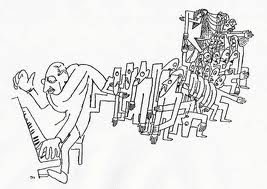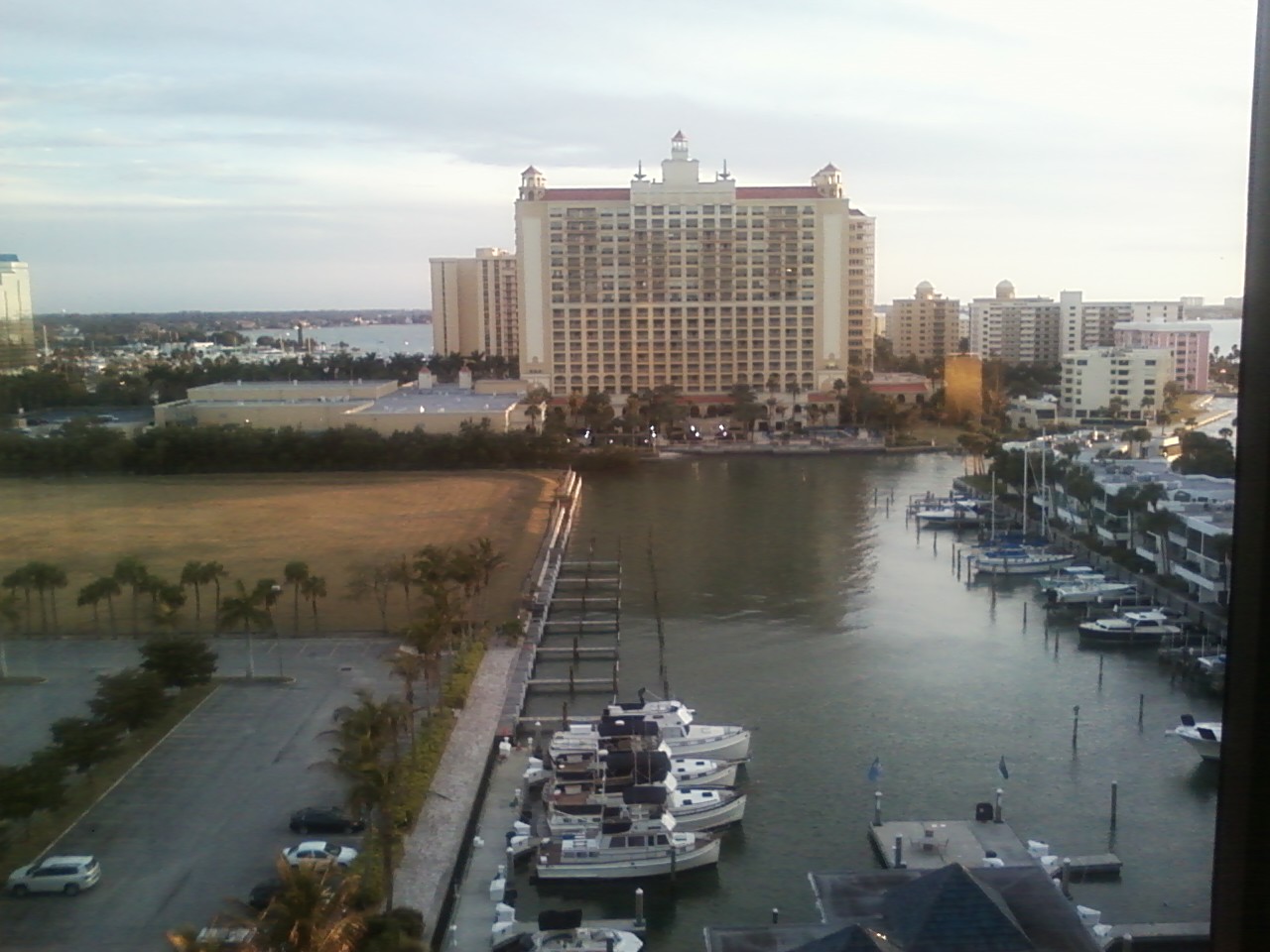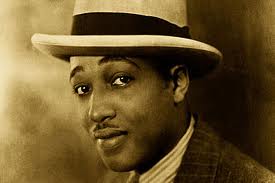I’m in suspended animation, sort of. I was supposed to fly last night from Sarasota, Florida, to New York’s Kennedy Airport, but my flight was canceled in the afternoon and rescheduled for this morning. Later in the day my new flight was canceled, leading to a mildly amusing absurdity: JetBlue then rescheduled me to arrive in New York at 11:32 Thursday morning and depart again for Sarasota at 12:18 that same afternoon.
Not that it mattered, since I’d needed to get to Manhattan in time to see two plays on Wednesday, a matinee and an evening performance, and meet with a stage director in between shows. The canceled flights thus took away the point of my trip, so I decided to be sensible and sit tight in Sarasota for two extra days.
 And what am I doing here? Nothing out of the ordinary. Last night I wrote another chunk of the third chapter of my Duke Ellington biography, on which I’ve been working since Mrs. T and I arrived in Florida last week. I got up this morning, ordered a room-service breakfast, knocked out my Friday drama column for The Wall Street Journal, and e-mailed it to New York. We’re staying at a waterfront hotel, and though it’s too brisk to swim, the sun is shining brightly, so the next thing on my agenda is a walk.
And what am I doing here? Nothing out of the ordinary. Last night I wrote another chunk of the third chapter of my Duke Ellington biography, on which I’ve been working since Mrs. T and I arrived in Florida last week. I got up this morning, ordered a room-service breakfast, knocked out my Friday drama column for The Wall Street Journal, and e-mailed it to New York. We’re staying at a waterfront hotel, and though it’s too brisk to swim, the sun is shining brightly, so the next thing on my agenda is a walk.
Needless to say, I’m going to keep on chipping away at the Ellington book while I’m here, but neither Mrs. T nor I has ever been to the Ringling Museum of Art, so an afternoon field trip may be in order. On Friday night we’ll go to Asolo Rep’s revival of Twelve Angry Men, which is why we came to Sarasota in the first place. The next day, weather permitting, I’ll fly up to Philadelphia for the workshop performances of Danse Russe about which I posted earlier today.
I have, in short, plenty to do, but I’m still at loose ends. My life requires me to live by the clock, and it always throws me for a loop when that clock gets stopped, whatever the reason may be. Last week’s vacation on Sanibel Island was part of a carefully wrought plan–seven days of relaxation–and so doing nothing seemed all right to me. Today, by contrast, I ought to be be tearing up and down the snowy streets of Manhattan, slipping and sliding from one appointment to the next. Instead I’m sitting in a hotel room in Sarasota, looking at the sun on the water and feeling vaguely guilty.
Such guilt, I suspect, is one of the curses of modernity: these days precious few of us know know how to turn loose the passing hours and let them go unregretted. Perhaps I’ll feel better about their passing later today, and I already know I should regard it as an act of grace. For the moment, though, I can’t shake off the nagging suspicion that I’m somehow to blame for their demise.
Archives for January 2011
TT: Two giant steps
 Danse Russe, my latest operatic collaboration with Paul Moravec, will be given two staged workshop performances this weekend, the first on Saturday night in Wilmington, Delaware, and the second on Sunday afternoon in Philadelphia, where Center City Opera Theater will be giving the world premiere on April 28. This one-act opera is a backstage comedy about the making of The Rite of Spring, and Paul and I have been busily revising it ever since the first workshop performance in November. These latest performances are open to the public, and assuming that the sky doesn’t fall again, stranding me somewhere in Florida, I’ll be present at both of them.
Danse Russe, my latest operatic collaboration with Paul Moravec, will be given two staged workshop performances this weekend, the first on Saturday night in Wilmington, Delaware, and the second on Sunday afternoon in Philadelphia, where Center City Opera Theater will be giving the world premiere on April 28. This one-act opera is a backstage comedy about the making of The Rite of Spring, and Paul and I have been busily revising it ever since the first workshop performance in November. These latest performances are open to the public, and assuming that the sky doesn’t fall again, stranding me somewhere in Florida, I’ll be present at both of them.
For more information, go here.
TT: Snapshot
Joe Venuti and Eddie Lang play “Wild Cat” in King of Jazz:
(This is the latest in a weekly series of arts-related videos that appear in this space each Wednesday.)
TT: Almanac
“There is nothing, I think, in which the power of art is shown so much as in playing the fiddle. In all other things we can do something at first. Any man will forge a bar of iron, if you give him a hammer; not so well as a smith, but tolerably. A man will saw a piece of wood, and make a box, though a clumsy one; but give him a fiddle and a fiddle-stick, and he can do nothing.”
Samuel Johnson (quoted in James Boswell, Life of Johnson)
TT: If you’ve got to be stranded…
…there are definitely worse places than Sarasota in January. This is the view from our hotel room:

TT: What I do for love (and money)
 Mrs. T are packing our bags this morning on Florida’s Sanibel Island. I won’t soon forget what a blissful time we’ve had there, but if anything can put our happiness out of my mind, however temporarily, it’s my schedule for the next seven days, which is more than a little bit crazy.
Mrs. T are packing our bags this morning on Florida’s Sanibel Island. I won’t soon forget what a blissful time we’ve had there, but if anything can put our happiness out of my mind, however temporarily, it’s my schedule for the next seven days, which is more than a little bit crazy.
Later today we’ll drive north to Sarasota to spend a few days catching up with Asolo Rep, whose revival of Bertolt Brecht’s Life of Galileo made my Wall Street Journal best-of-2010 list. Unfortunately, there’s a catch, which is that I have to drop Mrs. T off in Sarasota this afternoon and fly north to New York so that I can see two plays there on Wednesday, The Importance of Being Earnest and Other Desert Cities. Then I’ll fly back down to Sarasota to see Asolo’s Twelve Angry Men–and then I’ll fly back up to Philadelphia to attend a pair of staged workshop performances on Saturday and Sunday of Danse Russe, my new opera. I’ll also be catching a play in Philly, the Arden Theatre revival of Eugene O’Neill’s A Moon for the Misbegotten. The craziness is over a week from today, when I return to Florida and begin my latest residency at Rollins College’s Winter Park Institute. Whew!
In case you’re wondering, I’ve been watching the weather, and it looks like I’m going to get into New York tonight before the snow starts in earnest. My hope is that by the time I’m supposed to leave, the runways will be clear and I can fly back down to Florida without incident. We’ll see–and so will you. In the meantime, don’t expect to hear much of anything from me other than travel updates! This is, to put it mildly, one of those weeks….
P.S. The blizzard caught me–my flight to New York has already been canceled. We’ll see how the rest of the week turns out!
TT: Almanac
“Bureaucracy forms a truly supranational freemasonry, with the same quirks, the same incalculable workings of the mind, and the same lack of logic.”
Joseph Szigeti, With Strings Attached: Reminiscences and Reflections
TT: Landmark
I’ve spent the past week on Florida’s Sanibel Island working on Black Beauty: A Life of Duke Ellington. Yesterday morning I finished writing the second chapter, in which I describe the first eighteen years of Ellington’s life. Here are the last two paragraphs. I hope you like them!
* * *
 The patterns of Duke Ellington’s life and personality were now firmly set, and they looked quite a bit like the complicated shape of life on U Street, the neighborhood in Washington, D.C., where he grew up. The hours he had spent rubbing shoulders with ragtime pianists, Pullman porters, petty thieves, and card sharps in Frank Holliday’s poolroom had introduced him to a way of living far removed from the middle-class world into which he had been born. To the end of his life he recalled with undiminished relish the lessons he learned there: “Interns used to come in, who could cure colds. And handwriting experts who would enjoy copying somebody’s signature on a check, go out and cash it, and bring back the money to show the cats in the poolroom what artists they were. They didn’t need the money. They did it for the kicks. There were also a couple of pickpockets around, so smooth that when they went to New York they were not allowed in the subway. At heart, they were all great artists.”
The patterns of Duke Ellington’s life and personality were now firmly set, and they looked quite a bit like the complicated shape of life on U Street, the neighborhood in Washington, D.C., where he grew up. The hours he had spent rubbing shoulders with ragtime pianists, Pullman porters, petty thieves, and card sharps in Frank Holliday’s poolroom had introduced him to a way of living far removed from the middle-class world into which he had been born. To the end of his life he recalled with undiminished relish the lessons he learned there: “Interns used to come in, who could cure colds. And handwriting experts who would enjoy copying somebody’s signature on a check, go out and cash it, and bring back the money to show the cats in the poolroom what artists they were. They didn’t need the money. They did it for the kicks. There were also a couple of pickpockets around, so smooth that when they went to New York they were not allowed in the subway. At heart, they were all great artists.”
Yet Ellington would never turn his back on the other lessons in life that he had learned from J.E., Daisy, and their genteel neighbors. He regarded them as equally valid, just as he learned as much from listening to “the schooled musicians who had been to the conservatory” as he did from the untrained pianists whose homemade methods he emulated: “Everybody seemed to get something out of the other’s playing–the ear cats loved what the schooled guys did, and the schooled guys, with fascination, would try what the ear cats were doing.” It did not occur to him that his own elegant carriage was inconsistent with his racial identity, any more than that the authenticity of his music might somehow be compromised by its urbanity. That, he knew, bespoke a constrictingly narrow notion of “blackness.” Throughout his life he delighted in pointing out that Harlem “has always had more churches than cabarets,” and the composer of Black, Brown and Beige needed no one to remind him that black people came in all shades. “Once I asked him what he considered a typical Negro piece among his compositions,” a white friend recalled. “He paused a moment before he came up with ‘In a Sentimental Mood.’ I protested a bit and said I thought that was a very sophisticated white kind of song and people were usually surprised when they learned it was by him. ‘Ah,’ he said, ‘that’s because you don’t know what it’s like to be a Negro.'”
Never did he harbor the slightest doubt of his own knowledge of what it was like to be a Negro, or his ability to turn that knowledge into music that gave voice to his people’s anguish–and aspiration.
